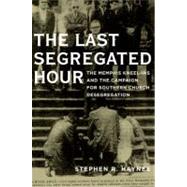The Last Segregated Hour The Memphis Kneel-Ins and the Campaign for Southern Church Desegregation
, by Haynes, Stephen R.- ISBN: 9780195395051 | 0195395050
- Cover: Hardcover
- Copyright: 10/25/2012
Throughout the South, the Civil Rights Movement inched along over a period of years, making segregated facilities and discriminatory practices the focus of attention and conflict. In The Memphis Kneel-Ins, Stephen Haynes brings to life a dramatic, yet little studied, tactic adopted byprotesters in the struggle. "Kneel-ins" were the tactic of choice for bringing attention to segregationist policies in Southern churches. These protests involved surprise visits to targeted churches, usually during Easter season. Often these visits led to physical standoffs, typically at the entrance of the church. The spectacle of kneeling worshippers barred from entering the church made for a strong image, and invited both local and national media attention. The Memphis kneel-ins of 1964-65 were unique in a number ofrespects, most notably in that the campaign was led by a group of mostly white students from the local Presbyterian college (Southwestern, now Rhodes). While kneel-in campaigns were almost never sustained for more than a week or two at a single church, in Memphis the protests at Second Presbyteriancontinued intermittently for nearly a year. Because the protesting students presented themselves in groups that were "mixed" by race and gender, white church members saw the visitations as a hostile provocation. At first, the clergy held aloof from the controversy, but eventually they were seized by moral compulsion and decided to take astand. Eventually the hardliners resigned to form another church. Haynes draws on a wide range of sources to tell this inspiring story, including extensive interviews with the former activists. This accessibly written work will not only appeal to scholars of religion and history, but will also be ofgreat interest to pastors and church people concerned about racially diverse congregations.







